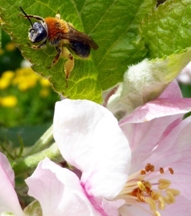Pollination deficits in UK apple orchards
DOI:
https://doi.org/10.26786/1920-7603(2014)8Abstract
Apple production in the UK is worth over £100 million per annum and this production is heavily dependent on insect pollination. Despite its importance, it is not clear which insect pollinators carry out the majority of this pollination. Furthermore, it is unknown whether current UK apple production, in terms of both yield and quality, suffers pollination deficits and whether production value could be increased through effective management of pollination services. The present study set out to address some of these unknowns and showed that solitary bee activity is high in orchards and that they could be making a valuable contribution to pollination. Furthermore, fruit set and apple seed number were found to be suffering potential pollination deficits although these were not reflected in apple quality. Deficits could be addressed through orchard management practices to improve the abundance and diversity of wild pollinators. Such practices include provision of additional floral resources and nesting habitats as well as preservation of semi-natural areas. The cost effectiveness of such strategies would need to be understood taking into account the potential gains to the apple industry.
Downloads
Published
2013-10-15
How to Cite
Garratt, M. P. D., Truslove, L., Coston, D., Evans, R., Moss, E., Dodson, C., … Potts, S. (2013). Pollination deficits in UK apple orchards. Journal of Pollination Ecology, 12, 9–14. https://doi.org/10.26786/1920-7603(2014)8
Issue
Section
Special Issue on Shaping the Future for Pollinators in Farmed Landscapes
License
Copyright (c) 2013 Michael Paul Douglas Garratt, Louise Truslove, Duncan Coston, Rebecca Evans, Ellen Moss, Cassie Dodson, Nigel Jenner, Jacobus Biesmeijer, Simon Potts

This work is licensed under a Creative Commons Attribution 4.0 International License.











